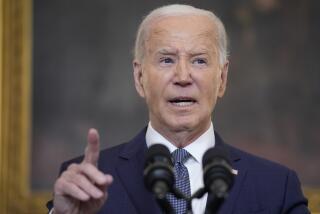Training Hussein’s Opposition
- Share via
WASHINGTON — Reversing a long-standing policy, the Bush administration is expected to seek congressional approval soon to provide military training for up to 10,000 members of the Iraqi opposition, according to administration officials and Iraqi opposition sources.
The goal is to create an array of forces to assist the U.S. military in a possible attack on Iraq, the U.S. and Iraqi sources say.
The White House move, which could come as early as this week, reflects the depth of commitment to toppling Iraqi President Saddam Hussein--and the quickening pace of military preparations targeting his regime.
“We have graduated to the next step of regime change,” said a well-placed administration source who requested anonymity.
The forces, to be culled from all of Iraq’s major ethnic and religious groups, would be trained in ways to coordinate with and help American troops. Administration sources insist that they would not be used to lead the charge against Hussein.
“They will be trained on U.S. systems and military capabilities, but that does not mean creating an armed insurrection group to go in itself as a tripwire [for war]. This is looking at them as support staff,” the administration official added.
To pay for the training, the White House now intends to notify Congress that it wants to use the $92 million yet to be allocated from the 1998 Iraq Liberation Act. The measure allows the Pentagon to provide training, nonlethal goods and services to seven opposition groups. After the White House notification, Congress then would have 15 days to ask questions or challenge the president’s decision.
Of the original $97 million approved by Congress, the Clinton administration allocated $5 million. So far, only $800,000 has been spent. About 130 Iraqis have been trained, but all in medical, computer and communications skills.
In the past, the Clinton and Bush administrations resisted appeals from the Iraqi opposition to use unspent funding for military training or for various military and nonmilitary operations inside Iraq. Some U.S. officials were concerned that such efforts could draw the United States into a conflict with Iraq.
Even now, before any training has begun, the administration’s plan has sparked some controversy, according to Iraqi sources.
Some of the Iraqi groups were angered when forms for training by the U.S. were circulated by the Iraqi National Congress in northern Kurdistan--without consultations with the two Kurdish groups that have the only major opposition fighters in Iraq, Kurdish officials said this week.
Iraqi sources said Tuesday that some of the groups eligible for training are trying to sort out the dispute and coordinate future recruitment efforts through their London offices.
Turkey is also concerned, according to Iraqi sources, about the impact of strengthening Kurds in tactics that could prove useful in a possible future bid for an independent Kurdistan on its borders. Turkey’s greatest domestic security issue stems from its own Kurds, who are agitating for greater autonomy or an independent Kurdistan.
Key players at the Pentagon, however, have long been pushing to change the policy against military training. When the act was passed in 1998, current Defense Secretary Donald H. Rumsfeld and his deputy, Paul D. Wolfowitz, wrote President Clinton as private citizens urging him to use the funds for operations inside Iraq.
In testimony to Congress in 1998, Wolfowitz said: “The heart of the problem is that the United States is unable or unwilling to pursue a serious policy in Iraq.”
During the 2000 campaign, President Bush promised to fully implement the act. But the tide did not turn until a meeting last month with leaders of the reunified Iraqi opposition, when the administration began closer consultations on both political and military plans, according to U.S. sources.
“After meeting with the Iraqi opposition ... we decided that this group is what we’ve been looking for--a group that can turn the corner and be a vehicle for hastening Saddam’s departure,” said a second administration official.
The diverse Iraqi opposition groups have been notified within the past two weeks of the administration’s intent to offer military training to as many as 10,000 Iraqis, according to three groups that represent Shiite and Sunni Muslims and ethnic Kurds. U.S. officials caution that the number receiving training could be lower.
“We’re very excited about this development. Anyone who can help the U.S. effort should be given a chance,” said Dr. Hatem Mukhlis, a physician and co-founder of the Iraqi National Movement, one of the opposition groups.
The training is likely to be outside Iraq, with the forces empowered to act inside Iraq if Bush makes the determination that the U.S. will wage a war against Hussein, administration sources said.
In developing options, the administration has explored the possibility of using some Iraqis as advance teams or forward observers, which could include assignments such as using laser-guided systems to identify targets on the ground for U.S. warplanes, according to Pentagon sources.
Other options under consideration include more sophisticated military training to enable the forces to target Baghdad’s command and control structure and other key parts of Iraq’s infrastructure, according to the sources.
But these higher-profile options have been scaled back, at least for now. Under the current plan, the program will focus primarily on training interpreters, guides and others who can assist in both Iraq’s southern desert terrain and rugged northern mountains. The plan also includes training new security forces to deal with military defectors, prisoners of war and possibly local police duties, according to U.S. officials.
The administration also is going to notify Congress of its intent to add six more Iraqi groups to the list of opposition forces receiving U.S. aid and training, the sources added.
More to Read
Sign up for Essential California
The most important California stories and recommendations in your inbox every morning.
You may occasionally receive promotional content from the Los Angeles Times.













